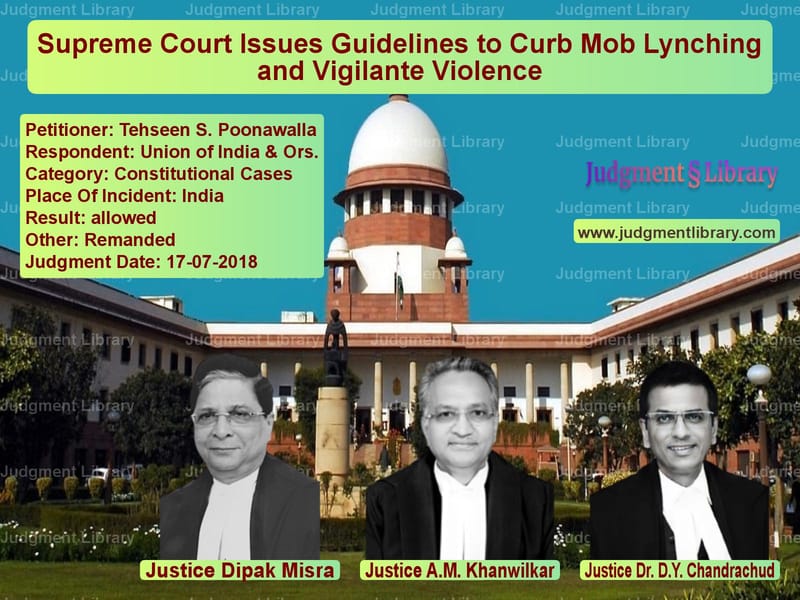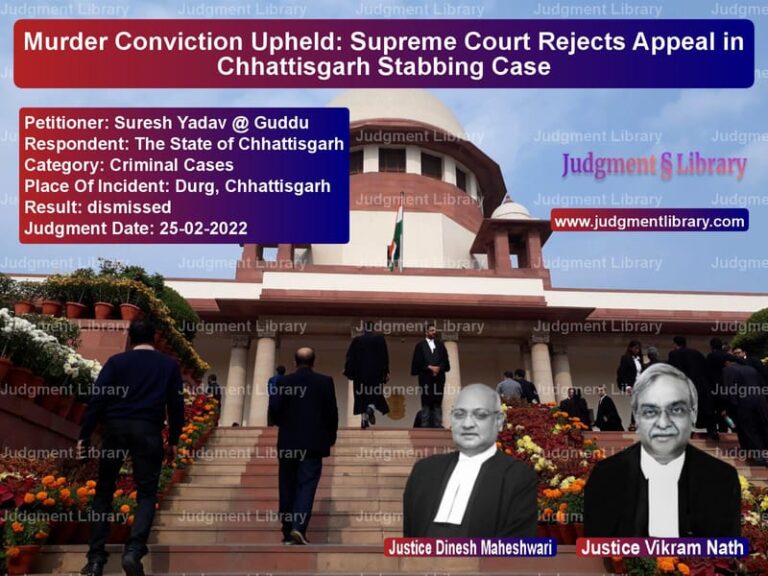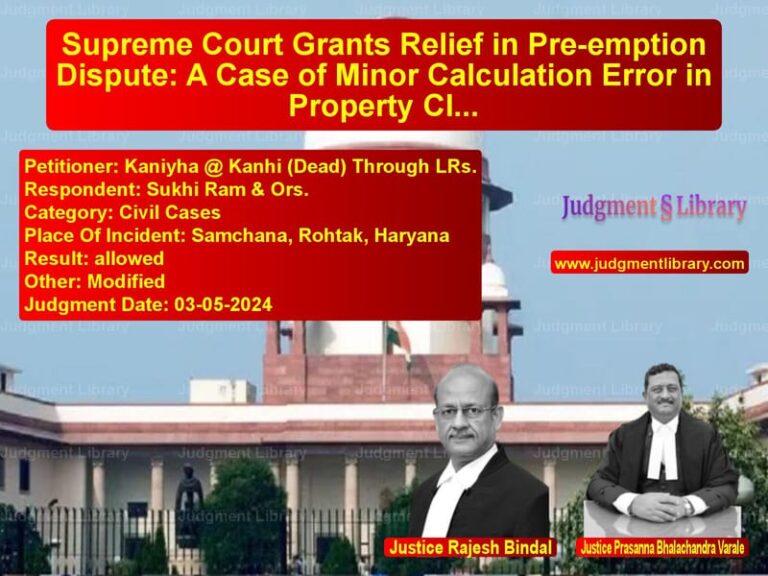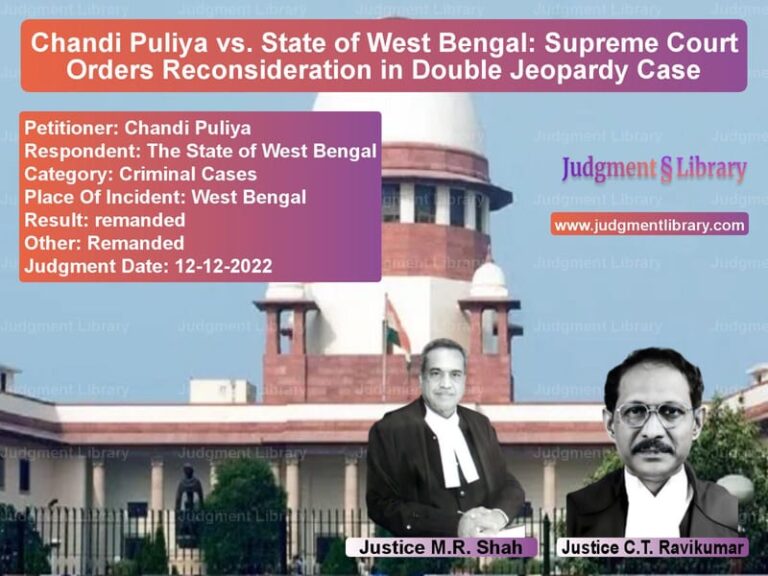Supreme Court Issues Guidelines to Curb Mob Lynching and Vigilante Violence
The Supreme Court of India, in the case of Tehseen S. Poonawalla vs. Union of India & Ors., addressed the growing menace of mob lynching and vigilante violence, particularly in cases related to cow vigilantism. The Court ruled that mob violence and lynching are serious threats to the rule of law and must be curbed through preventive, remedial, and punitive measures.
Background of the Case
The petitioner, a social activist, filed a writ petition under Article 32 of the Constitution seeking urgent judicial intervention to prevent acts of lynching and violence by self-styled cow vigilante groups. The petition highlighted multiple incidents of mob violence targeting individuals based on suspicion, particularly in cases related to cow protection.
The Supreme Court clubbed this petition with other similar cases concerning incidents of lynching across different states and issued a comprehensive set of guidelines.
Key Legal Issues Considered
- Whether lynching and mob violence violate fundamental rights under the Indian Constitution.
- The State’s responsibility in preventing and punishing mob violence.
- The role of social media in spreading misinformation that incites mob violence.
- Whether there was a need for a separate anti-lynching law.
Arguments Presented
Arguments by the Petitioner (Tehseen S. Poonawalla)
- The petitioner argued that self-proclaimed cow vigilantes had taken the law into their own hands, resulting in mob killings.
- He emphasized that such acts violate fundamental rights under Articles 14, 19, and 21 of the Constitution.
- He urged the Court to direct the Union and State Governments to take immediate steps to prevent mob lynching.
- The petitioner also sought the removal of violent content from social media that incites mob violence.
Arguments by the Respondents (Union of India & Various States)
- The Union of India argued that law and order is a state subject and states are responsible for dealing with such incidents.
- State governments claimed they had taken necessary legal action against vigilantes and filed affidavits detailing measures taken.
- The Solicitor General submitted that existing laws were sufficient to tackle lynching and a separate law was not required.
Supreme Court’s Observations
The Supreme Court strongly condemned mob lynching and vigilante violence, stating:
“The majesty of law cannot be sullied simply because an individual or a group generates the attitude that they have been empowered by the principles set out in law to take its enforcement into their own hands.”
The Court recognized that intolerance and vigilantism disrupt social harmony and must be dealt with strictly.
Final Judgment
The Supreme Court issued the following guidelines under three categories: Preventive, Remedial, and Punitive Measures.
A. Preventive Measures
- Each state must appoint a senior police officer as a Nodal Officer to monitor incidents of lynching.
- District authorities must identify areas where lynching and mob violence have been reported and take preventive action.
- State governments must curb the spread of fake news and incendiary content on social media.
- Police must conduct regular patrolling in sensitive areas to prevent mob violence.
B. Remedial Measures
- If an incident of lynching occurs, an FIR must be registered immediately.
- The State Governments must provide compensation to victims of lynching under a victim compensation scheme.
- Trial courts must conduct fast-track trials in lynching cases, concluding proceedings within six months.
C. Punitive Measures
- Police officers failing to take action in lynching cases will face disciplinary proceedings.
- The State Government must take strict action against organizations spreading hate speech.
- Convicted individuals must receive maximum punishment under relevant laws.
Impact of the Judgment
This ruling has far-reaching consequences for law enforcement and the judicial system:
- Zero Tolerance for Vigilantism: The ruling reinforces that no group has the right to take the law into its own hands.
- Strengthened Law Enforcement: States must deploy resources to prevent mob violence.
- Accountability of Social Media: The Court directed the government to ensure that false and inflammatory messages are not spread.
- Need for an Anti-Lynching Law: The Court recommended that Parliament pass a special law to criminalize mob lynching.
Legal Precedents Considered
The Supreme Court relied on various precedents, including:
- Shakti Vahini vs. Union of India (2018) – Addressed honor killings and ruled that extrajudicial punishment by mobs is unconstitutional.
- Pravasi Bhalai Sangathan vs. Union of India (2014) – Recognized the need for strict action against hate speech.
- Nandini Sundar vs. State of Chhattisgarh (2011) – Highlighted the state’s duty to curb violence by self-proclaimed vigilantes.
Conclusion
The Supreme Court’s judgment in Tehseen S. Poonawalla vs. Union of India & Ors. is a landmark ruling that reinforces India’s commitment to upholding the rule of law. By issuing comprehensive guidelines, the Court has laid down a clear framework for preventing and punishing mob lynching. The recommendation for a separate anti-lynching law underscores the urgency of the issue and the need for strict legal measures to curb vigilantism.
Petitioner Name: Tehseen S. Poonawalla.Respondent Name: Union of India & Ors..Judgment By: Justice Dipak Misra, Justice A.M. Khanwilkar, Justice Dr. D.Y. Chandrachud.Place Of Incident: India.Judgment Date: 17-07-2018.
Don’t miss out on the full details! Download the complete judgment in PDF format below and gain valuable insights instantly!
Download Judgment: Tehseen S. Poonawall vs Union of India & Ors Supreme Court of India Judgment Dated 17-07-2018.pdf
Direct Downlaod Judgment: Direct downlaod this Judgment
See all petitions in Fundamental Rights
See all petitions in Public Interest Litigation
See all petitions in Separation of Powers
See all petitions in Judgment by Dipak Misra
See all petitions in Judgment by A M Khanwilkar
See all petitions in Judgment by Dhananjaya Y Chandrachud
See all petitions in allowed
See all petitions in Remanded
See all petitions in supreme court of India judgments July 2018
See all petitions in 2018 judgments
See all posts in Constitutional Cases Category
See all allowed petitions in Constitutional Cases Category
See all Dismissed petitions in Constitutional Cases Category
See all partially allowed petitions in Constitutional Cases Category







